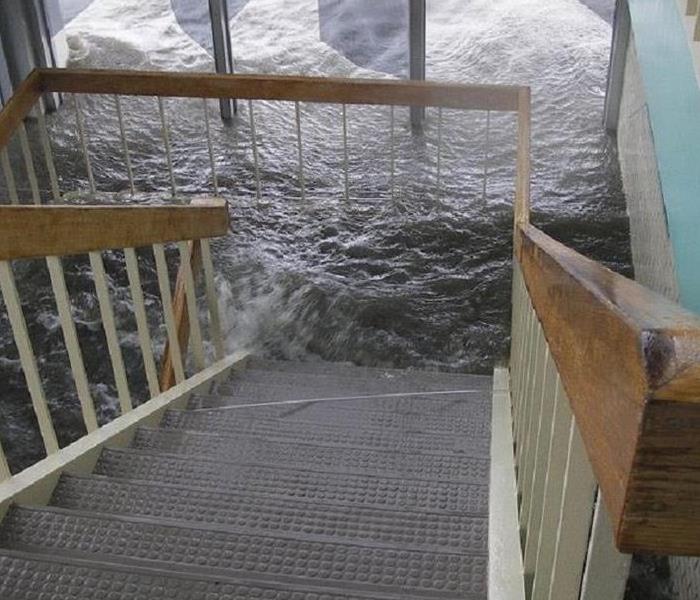How to Clean Up from a Flooded Basement
9/19/2018 (Permalink)
With the recent storms and flooding, many homes throughout central Indiana may have suffered from the unfortunate event of a flooded basement. There is nothing so frustrating as looking down your basement stairs and discovering that your basement is now under water along with all the belongings that you have stored down there. So you’ve discovered a lake in your basement, now what do you do? Below we will cover things you should do and shouldn’t do and how ultimately to clean and restore your flooded basement.
Be Careful - Water and Electricity Do Not Mix
If there is standing water in your basement, do not go near it. You should not assume that the power has been cut off by the home’s circuit breaker. If your home’s circuit box is located in a dry area of your home, then you should check the breaker box to see if the circuits powering the basement have been tripped and are off. If you have a hot water heater or furnace in the basement, they should be powered off also from the breaker box.
If you are unsure that all of the power is off in the basement, then wait until the water has completely resided or call an electrician or professional flood cleanup company. They will know what to check or who to contact to ensure there is no power going to the flooded basement.
You Don’t Know Where That Water Has Been
The second danger with a flooded basement is that you don’t know where the water originated. While it could be rainwater that has pooled up once the sump pump went out, it could also be from the municipal sewer system backing up. When the local sewer system floods and backs up, it heads to the lowest points first, which are basements. Some home’s main sewer pipes have check valves to prevent the sewer system from backing up into their basements but many homes do not.
If your basement has a floor drain or bathroom, the sewer system may back up into your basement. Obviously, you don’t want to get anywhere near that water as it can be harmful to your health. Since you don’t know where the water has come from, it always better to be safe than sorry. Wait until the water has resided and try to avoid any skin contact with the water. Even it is isn’t sewage water, it could contain other chemicals and contaminants from your basement or the flood waters outside your home.
So What Should Be Done If A Basement Floods?
As you can see, there are a lot of dangers from a basement flooding. The best thing to do if your basement has flooded is to call a water damage cleanup company, like SERVPRO of Indianapolis West. They have the expertise, equipment, and tools to remove the water, dry the basement, remediate any mold or potential mold, and restore your basement.
Once the water in the basement subsides or has been pumped out, then it’s a matter of removing all the water soaked items like furniture, storage boxes, area rugs, and more. If there is carpeting in the basement, it will probably need to be commercially vacuumed to extract the water If there is drywall in the basement, then it may need to be removed or at least partially removed. Drywall can absorb the flood waters and if not removed, it can lead to mold growth. All wood and porous surfaces must also be treated to prevent mold from growing. There are a lot of areas in a basement where the water can seep into and lead to extensive mold growth and damage.
Don’t Risk Further Damage. Contact the Water & Mold Damage Cleanup Professionals.
A flooded basement can be a huge mess that can quickly turn into an even bigger mess. That is why you should trust the professionals at SERVPRO of Indianapolis West to clean up your flooded basement and return it back to normal. They deal with flooded basements, homes, and businesses on a regular basis and know just what to do to clean and restore all the damage. Whether it is on the weekends or in the middle of the night, you can call them anytime to show up and get right at work to restore your flooded basements.






 24/7 Emergency Service
24/7 Emergency Service
